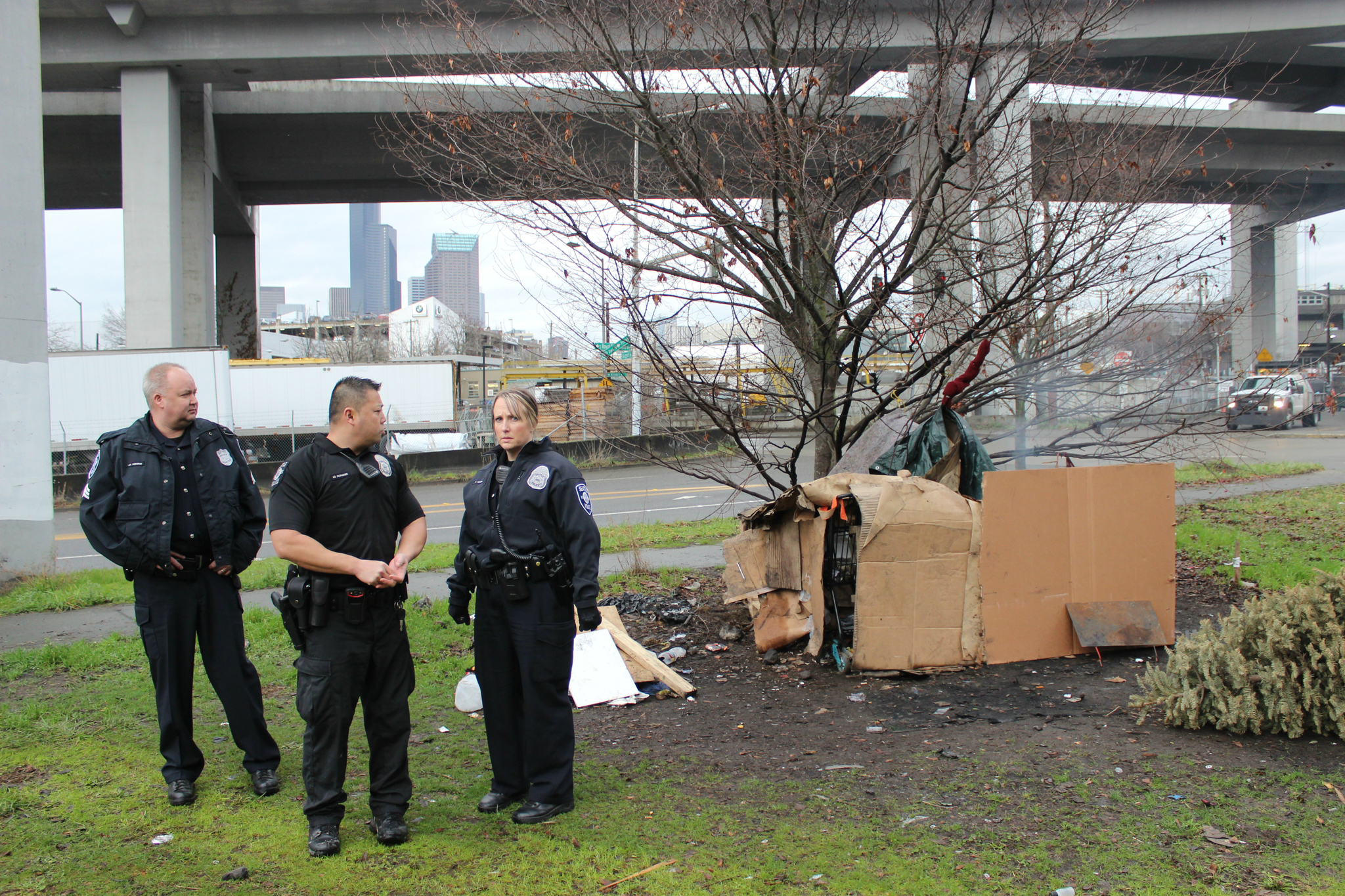At 2 p.m. today, Seattle City Council’s Human Services and Public Health committee will consider a resolution authored by Mayor Ed Murray’s office that would greenlight his plan to mass evict the perhaps 100 campers who still reside in “the Jungle,” an archipelago of homeless encampments along and beneath I-5. That plan is essentially a watered-down, more humane version of the eviction plan council shot down in May. It would allow campers to relocate to an adjacent field that has become a de facto, though not formally authorized, city encampment.
Murray’s Jungle eviction resolution is just one proposal among many for how to address the burgeoning crisis of housing affordability and unsheltered homelessness. There’s also a city-wide bill homeless advocates proposed last month which, as we reported, would only allow the city to evict encampments if the campers turn down an offer of “adequate and accessible” and immediately available housing, or if the encampment is especially dangerous (say, on a ledge above the I-5), in which case the city has to direct them to a “nearby, alternative location.” In effect, the advocates’ bill would abolish homeless encampment evictions and allows only encampment relocations. While the mayor’s resolution addresses only the Jungle and the advocates’ bill would apply city-wide, the fact that the Jungle is located inside Seattle means that the two proposals are competitors in practice.
But wait, there’s more! Further complicating the picture is a pair of reports and an action plan requested by the mayor’s office which, rolled together, amount to a third, long-term proposal to shift Seattle’s homeless services from a grassroots, bottom-up collection of piecemeal solutions to a well-oiled, top-down, centrally-managed machine. Specifically, the reports—and particularly star consultant Barbara Poppe—want better data on real-time homeless needs and resources, competitive service provider contract awards, and targeted outreach for chronic shelter users (in the hope that, once unclogged of chronic users, the shelter system will start housing recently-homeless people more efficiently). As we’ve reported previously, Lisa Daugaard, director of the Public Defender Association and a proponent of the advocate’s bill, said that the reports contain “several welcome conclusions” such as reaffirming the importance of barriers to housing, yet also miss a big chunk of the picture by not addressing, for instance, how to sustainably shelter a population with lots of active drug users. Real Change’s Tim Harris criticized the reports ruling out from their analysis big-picture causes of homelessness like wealth inequality or mass incarceration, saying they contain mere “pieties about how to deal with homelessness without making any systemic changes.”
Finally, there are two task forces complicating the picture. One is the mayor’s homeless encampment “Cleanup Protocol Task Force,” whose members include Sally Bagshaw (who didn’t support the advocates’ proposal when it was introduced) and former city councilmember Sally Clark. That task force hasn’t yet issued any recommendations. The other is the Heroin and Prescription Opioid Task Force, convened by the executives of King County, Seattle, Auburn, and Renton. The opioid task force won’t formally present their final recommendations until Thursday, but sources who spoke on condition of anonymity say that those recommendations will likely include the establishment of one or more safe drug consumption sites as part of a larger suite of public health measures to address the opioid crisis.
Technically, Murray doesn’t have to get the council’s permission to evict the Jungle—or Queen Anne, for that matter. As we pointed out when he declared (and council approved) a formal state of emergency in November 2015, Murray now has the emergency authority to enforce curfews, close bars and gun shops, evacuate part or all of the city, and any “other orders as are imminently necessary for the protection of life and property,” per city code. Of course, a two-thirds majority of council could vote to revoke that emergency authority at any time, giving the executive a strong incentive to keep the council happy.
On the other hand, homeless advocates and their allies on council have an incentive to find middle ground with Murray and the state Dept. of Transportation (which owns much of the Jungle). Suppose they can negotiate a cleanup plan that includes truly adequate accomodations for Jungle campers (for instance, by cleaning the Jungle in sections rather than evicting everyone at the same time, as Bagshaw has suggested in the past). Once that physical cleanup is done, Murray and WA-DOT will no longer have any excuse for clearing the Jungle. And, bonus, the cleanup includes infrastructural improvements like better service roads, which would make it easier to deliver services (and, potentially, toilets, trash cans and sharps containers) to Jungle campers once they inevitably return.








